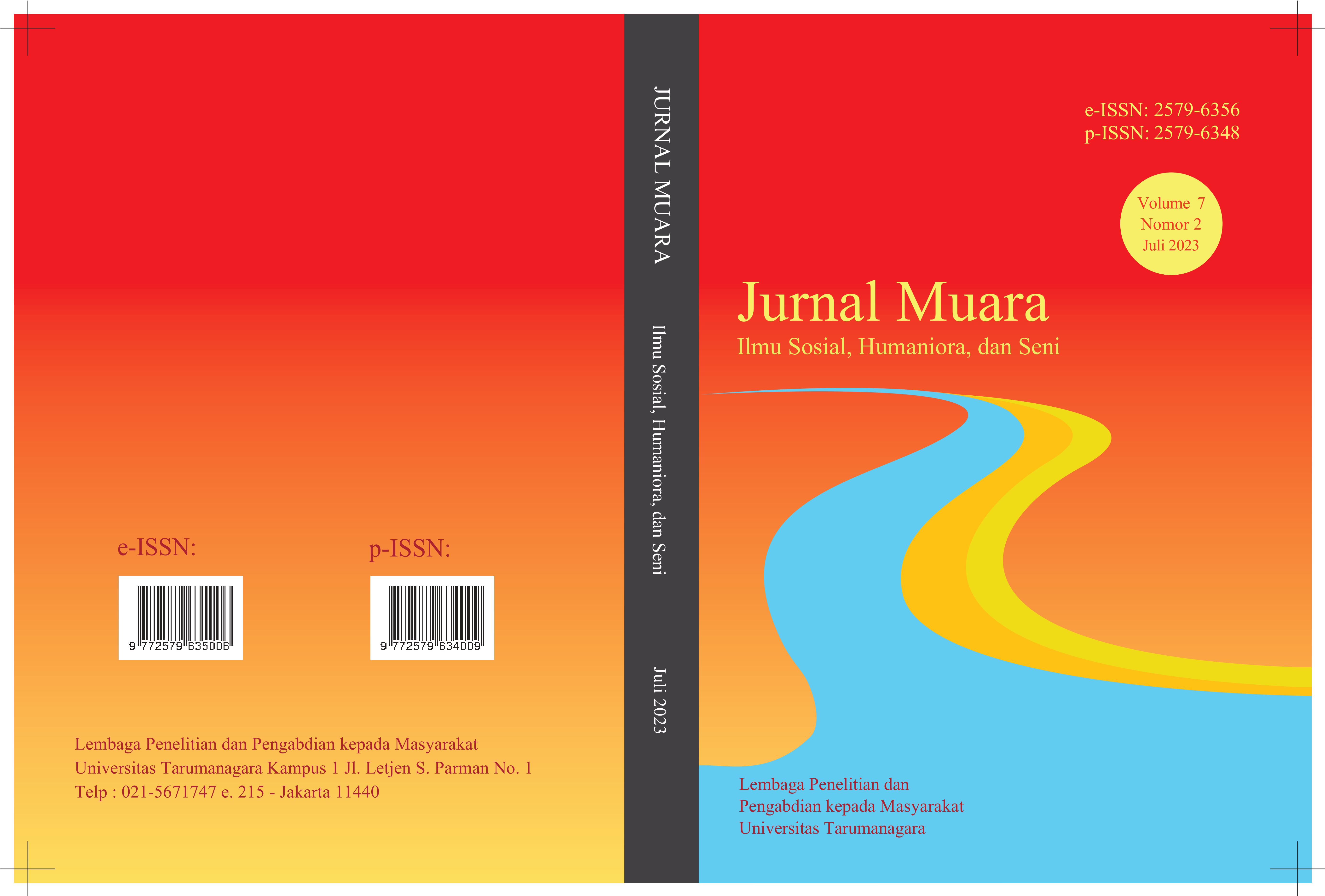APAKAH DIGITAL STRESS DAPAT MEMENGARUHI WORK ENGAGEMENT PADA KARYAWAN E-COMMERCE?
Main Article Content
Abstract
Dunia tengah mengalami perubahan, dan perubahan terbesar terjadi di ranah penggunaan teknologi. Perkembangan industri organisasi, yang beberapa tahun terakhir ini marak adalah organisasi atau perusahaan berbasis digital, diantaranya di bidang bisnis e-commerce. Persaingan bisnis yang ketat dengan para kompetitor menjadi tantangan besar, dan untuk tetap bertahan dan bertumbuh bisnisnya diperlukan karyawan berkualitas guna mendorong laju keberhasilan organisasi. Karyawan yang bekerja dengan perasaan termotivasi dan terikat dengan pekerjaannya mampu memberikan hasil kerja yang optimal, dan hal ini dapat memberi keuntungan lebih besar pada perusahaan. Dalam ranah ilmu Psikologi, keterikatan karyawan dengan pekerjaannya dikenal dengan istilah work engagement. Karyawan yang engaged akan bersemangat dan senang ketika bekerja serta menikmati setiap prosesnya meskipun dengan tuntutan pekerjaan yang cukup banyak. Salah satu faktor yang dapat memengaruhi work engagement yaitu digital stress yang diartikan sebagai fenomena stres yang muncul sebagai akibat dari ketidakmampuan karyawan beradaptasi dengan perkembangan sistem teknologi guna menyelesaikan tuntutan pekerjaannya. Penelitian ini bertujuan untuk mengetahui dampak digital stress terhadap work engagement khususnya di kalangan karyawan e-commerce. Metode yang digunakan pada penelitian ini adalah metode kuantitatif dengan partisipan sebanyak 218 karyawan e-commerce. Alat ukur yang digunakan dalam penelitian ini yaitu Utrecht Work Engagement Scale (UWES-17) serta Digital Stressor Scale (DSS). Hasil analisis regresi menunjukkan bahwa digital stress berpengaruh negatif terhadap work engagement (β = -0.291, p < 0.05) dan digital stress memberikan kontribusi sebesar 8.6% terhadap work engagement pada karyawan e-commerce.
Article Details
Section

This work is licensed under a Creative Commons Attribution-NonCommercial-ShareAlike 4.0 International License.
This work is licensed under a Jurnal Muara Ilmu Sosial, Humaniora, dan Seni Creative Commons Attribution-ShareAlike 4.0 International License.References
Ahaskar, A., & Pathak, K. (2021, Februari 8). Startup look to tackle work stress. Mint.https://www.livemint.com/companies/start-ups/startups-look-to-tackle-work-stress-11612765553615.html
Andrulli, R. (2020). The impact of technostress on well-being in times of covid-19 and new ways of working: the mediating roles of the need for recovery and work engagement [Tesis magister tidak dipublikasikan]. Maastricht University.
Annisa, T. (2021, September 8). 8 Cara tepat meningkatkan produktivitas karyawan. Ekrut Media. https://www.ekrut.com/media/5-cara-tepat-meningkatkan-produktivitasa-karyawan
Aryatno, R. M. (2019). The Relationship Between Work Engagement and Burnout in Ditpolair Korpolairud Baharkam Polri. Psychological Research and Intervention, 2(2), 40–46. https://doi.org/10.21831/pri.v2i2.30361
Cassidy, G. (2020, Februari 24). The fine line between stressed and disengaged employees. Employee Benefit News. https://www.benefitnews.com/opinion/the-difference-between-stressed-and-disengaged-employees
Collier, E. (2018, April 2). How to increase productivity in the workplace. High Speed Training. https://www.highspeedtraining.co.uk/hub/productivity-in-the-workplace/#:~:text=Well%2C%20if%20your%20employees%20complete,of%20their%20work%20will%20improve.
Daon. (2019, Februari 28.). Kemkominfo: Pertumbuhan e-commerce indonesia capai 78 persen. Kementerian Komunikasi dan Informatika Republik Indonesia. https://kominfo.go.id/content/detail/16770/kemkominfo-pertumbuhan-e-commerce-indonesiacapai-78-persen/0/sorotan_media
Farmania, A., Elsyah, R. D., & Fortunisa, A. (2022). The phenomenon of technostress during the covid-19 pandemic due to work from home in Indonesia. Sustainability, 14(14), 8669. https://doi.org/10.3390/su14148669
Fischer, T., Reuter, M., & Riedl, R. (2021). The digital stressors scale: Development and validation of a new survey instrument to measure digital stress perceptions in the workplace context. Frontiers in Psychology, 12, 2-3. doi: 10.3389/fpsyg.2021.607598
Ginanjar, S. (2021, April 22). Karyawan adalah aset terbesar perusahaan. Kompasiana.https://www.kompasiana.com/ginasuryadinata/5c696c9ec112fe32ad5e9515/karyawan-adalah-aset-terbesar-perusahaan
Gould, W. R. (2020, Februari 14). The hidden stressors of technology you should be aware of. Verywell Mind. https://www.verywellmind.com/the-hidden-stressors-of-technology-4783960
Harunavamwe, M., & Ward, C. (2022). The influence of technostress, work–family conflict, and perceived organisational support on workplace flourishing amidst COVID-19. Frontiers in Psychology, 13, 1-17. https://doi.org/10.3389/fpsyg.2022.921211
Hoffower, H. (2022, Agustus 29). Gen z didn’t come close to inventing quiet quitting. ‘it’s a tale as old as time.’ Fortune. https://fortune.com/2022/08/27/what-is-quiet-quitting-gen-z-doing-bare-minimum-slacker-work-life-balance/
Jiang, E. (2021, Januari 18). Two Chinese e-commerce workers die “from overworking” and a third one sets himself on fire “in protest against unpaid wages”, sparking outrage over their dire working conditions. Mail Online. https://www.dailymail.co.uk/news/article-9159135/Two-Chinese-e-commerce-workers-die-overworking-one-sets-fire.html
Lingga, M. A. (2019, Februari 12). E-commerce kian berkembang, Indonesia harus benahi SDM. Kompas. https://ekonomi.kompas.com/read/2019/02/12/135532426/e-commerce-kian-berkembang-indonesia-harus-benahi-sdm
Majir, A., & Nasar, I. (2021). Pengaruh e-commerce era industri 4.0 dan kesiapan menyambut Revolusi Society 5.0. Sebatik, 25(2), 530–536. https://doi.org/10.46984/sebatik.v25i2.1574
Mohammed, G. M. (2022). The impact of technostress on employees’ well- being: The role of work engagement and perceived supervisor support. International Journal of Science and Research, 11(1), 943–952. https://doi.org/10.21275/SR22117144703
Ragu-Nathan, T. S. (2008). The consequences of technostress for end users in organizations: Conceptual development and empirical validation. Information System Research, 19(4), 417–433. https://doi.org/10.1287/isre.1070.0165
Rantanen, J., Lyyra, P., Feldt, T., Villi, M., & Parviainen, T. (2021). Intensified job demands and cognitive stress symptoms: The moderator role of individual characteristics. Frontiers in Psychology, 12, 1-12. https://doi.org/10.3389/fpsyg.2021.607172
Rivera, A. (2021, Desember 21). What is e-commerce?. Business News Daily. https://www.businessnewsdaily.com/4872-what-is-e-commerce.html
Schaufeli, W. B., & Bakker, A. B. (2004). Job demands, job resources, and their relationship with burnout and engagement: A multi-sample study. Journal of Organizational Behavior, 25(3), 293–315. https://doi.org/10.1002/job.248
Schaufeli, W. B., Salanova, M., González-Romá, V., & Bakker, A. B. (2002). The measurement of engagement and burnout: A two sample confirmatory factor analytic approach. Journal of Happiness Studies: An Interdisciplinary Forum on Subjective Well-Being, 3(1), 71–92. https://doi.org/10.1023/A:1015630930326
Purisiol, S. S. (2020). The effects of technostress on well-being and performance: The role of social support. [Tesis magister tidak dipublikasikan]. Tilburg University.
Qothrunnada, K. (2022, Maret 16). Revolusi industri 4.0: Pengertian, sejarah, dan contohnya di Indonesia. Detikfinance. https://finance.detik.com/berita-ekonomi-bisnis/d-5986030/revolusi-industri-40-pengertian-sejarah-dan-contohnya-di-indonesia
Yao, J. (2022). The relationship between work engagement and job performance: Psychological capital as a moderating factor. Frontiers in Psychology, 13, 1-8. https://doi.org/10.3389/fpsyg.2022.729131
Zamralita. (2017). Gambaran keterikatan kerja pada dosen-tetap ditinjau dari karakteristik personal. Jurnal Muara Ilmu Sosial, Humaniora, dan Seni,1(1), 338 – 345. https://doi.org/10.24912/jmishumsen.v1i1.374

